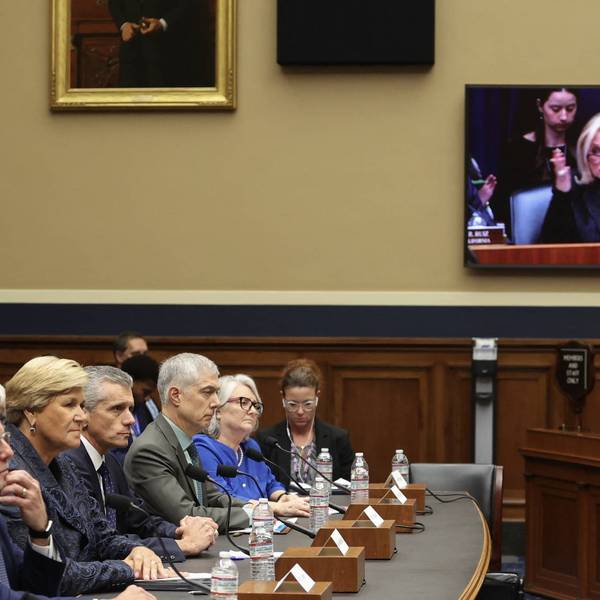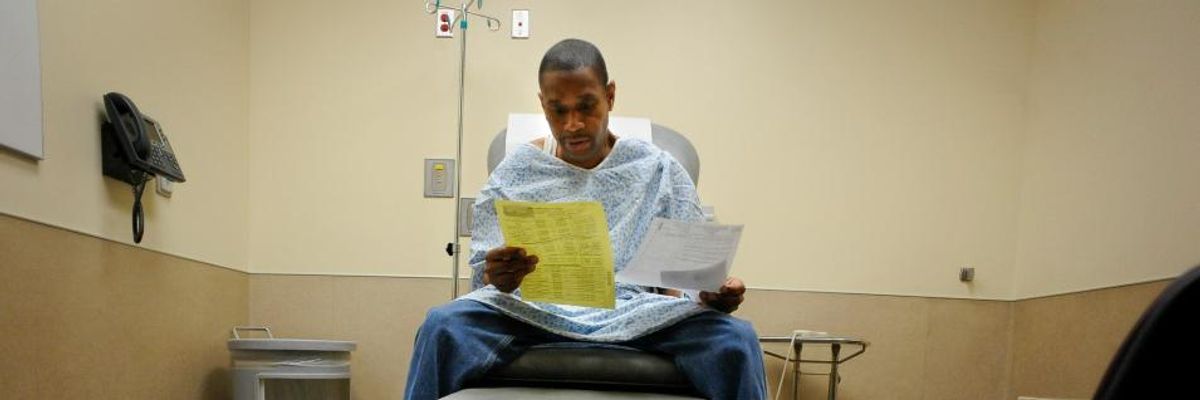Shedding more light on the fatal consequences of America's privatized and profit-driven healthcare system, a study published Tuesday found that a staggering 34 million people in the U.S. know of at least one friend or family member who has died over the past five years after being unable to afford sky-high treatment costs.
The new study by Gallup and the non-profit organization West Health surveyed over 1,000 U.S. adults from all 50 states. The report found that people making under $40,000 per year were more than twice as likely to know someone who has died due to inability to afford healthcare than were people making $100,000 or more per year.
"These tragic consequences of our for-profit healthcare system are why a majority of Americans support Medicare for All, where everyone would have guaranteed access to the healthcare they need."
--Melinda St. Louis, Public Citizen
Gallup and West Health also found that over 20 percent of non-white U.S. adults know someone who has died due to unaffordable treatment compared to 9 percent of white adults, highlighting the stark racial inequities in U.S. healthcare.
According to Dan Witters, a research director at Gallup who worked on the new study:
The substantial number of Americans who know someone who has died after not receiving treatment because of their inability to pay for it, coupled with the rise in the percentage who have not had enough money to pay for their prescriptions, underscores the urgency of the U.S. healthcare cost crisis. These realities starkly highlight the significant practical implications of drug prices on U.S. residents, as well as the effects of healthcare policy action--or inaction.
Melinda St. Louis, director of Public Citizen's Medicare for All campaign, told Common Dreams that the results of the study are "heartbreaking but unsurprising."
"In the United States, we treat basic healthcare as a privilege based on your wealth, employment status, or zip code," said St. Louis. "These tragic consequences of our for-profit healthcare system are why a majority of Americans support Medicare for All, where everyone would have guaranteed access to the healthcare they need."
HuffPost's Jeffrey Young reported Tuesday that while the Affordable Care Act significantly reduced the number of uninsured Americans, the "law didn't stop U.S. healthcare providers and drugmakers from charging the highest prices in the world."
"In addition, a growing number of Americans who have private health insurance face high out-of-pocket costs, such as deductibles that require the insured to spend thousands of dollars out of pocket before coverage benefits kick in," Young noted. "Those are among the reasons why 45 percent of Americans were 'underinsured' last year, meaning patients are left responsible for a larger share of their medical expenses than they can afford."
In an effort to highlight the financial pain America's uniquely expensive healthcare system has inflicted upon individuals and families, Public Citizen last week asked its 168,000 Twitter followers a straightforward question: "What's the most outrageous healthcare bill you've ever received?"
The informal survey elicited hundreds of shocking responses, many of which were highlighted by St. Louis in an op-ed for Common Dreams Monday.
"People told of being billed obscene amounts for everything from emergency room visits and urgent care treatment to chemotherapy," wrote St. Louis. "One person reported going bankrupt from a medical incident. Others included screen shots of their medical bills. '$26,000 for a colonoscopy.' '$10,000 for a kidney stone.' '$70,000 for a 24 hr. heart thing.'"
"If everyone in the country who has received a shocking bill for healthcare were to rise up, we would get Medicare for All," St. Louis added. "The good news is, the movement is growing and you can join it."
Correction: This post previously stated the Gallup/West Health study found that 34 million people in the U.S. know of someone who died because of their inability to afford healthcare. But the study only established that 34 million people know of someone who died after being unable to afford treatment.




